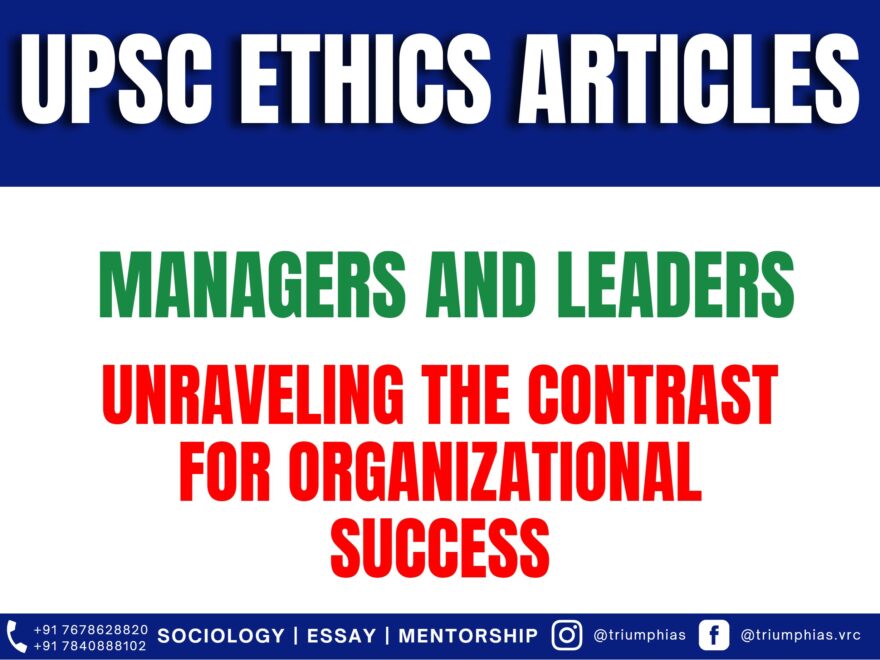Managers vs Leaders : Only “Seemingly” Similar But; Different As Chalk & Cheese
Relevant for UPSC Mains (Ethics, Integrity and Aptitude)

Managers vs Leaders
The conventional perspective on management in 1977 focused on organizational structure and processes. The primary emphasis of managerial development during that time was solely on building competence, control, and achieving a suitable balance of power. However, according to Abraham Zaleznik in his article, this viewpoint overlooked the essential leadership elements of inspiration, vision, and human passion, which are crucial for driving corporate or institutional success.

Zaleznik highlighted the distinction between managers vs leaders, asserting that it lies in their underlying conceptions of chaos and order. Managers embrace process, seek stability and control, and instinctively attempt to resolve problems quickly, sometimes without fully grasping the significance of the issue. On the other hand, leaders tolerate chaos and lack of structure, being willing to postpone closure in order to gain a deeper understanding of the matters at hand. In this way, Zaleznik argued that business leaders share more similarities with artists, scientists, and other creative thinkers than they do with managers.
Successful organizations require both managers vs leaders, but fostering their development necessitates shifting focus away from logic and strategic exercises. Instead, an environment must be created where creativity and imagination are allowed to flourish. The ideal approach to developing leadership varies across societies, each grappling with their own concerns regarding the purpose, distribution, and utilization of power.
In the business realm, a new type of leader called the manager has emerged, alongside a new power ethic that favors collective leadership over individual leadership. This shift promotes a group-oriented culture, particularly suited to assembly-line production and blue-collar jobs. While managerial leadership ensures competence, control, and power balance among competing groups, it may unfortunately not guarantee the presence of imagination, creativity, or ethical behavior when guiding corporate enterprises.
Leadership inherently involves the use of power to influence the thoughts and actions of others. However, when power is concentrated in the hands of an individual, certain risks arise. These include equating power solely with immediate results, disregarding legitimate ways of accumulating power, and losing self-control in the pursuit of power. To mitigate these risks, collective leadership and the managerial ethic have been developed. As a result, a culture of inherent conservatism prevails within large organizations.
John D. Rockefeller III, in his book The Second American Revolution, describes this organizational conservatism, emphasizing the resistance to change and the adherence to traditional practices. This conservatism leads to the promotion of managers rather than individual leaders as a means of succession planning and reinforces a bureaucratic culture in business, ironically serving as a safeguard against bureaucratic control in government and education.
To master these intricacies and fare well in the Sociology Optional Syllabus, aspiring sociologists might benefit from guidance by the Best Sociology Optional Teacher and participation in the Best Sociology Optional Coaching. These avenues provide comprehensive assistance, ensuring a solid understanding of sociology’s diverse methodologies and techniques.
Vikash Ranjan Sir Sociology, Best Sociology Optional Teacher, Best Sociology Optional Coaching, Sociology Optional Syllabus, Managers vs Leaders, organizational structure, Abraham Zaleznik, corporate success, creativity in leadership, collective leadership, managerial ethic, power in leadership, organizational conservatism, John D. Rockefeller III
Follow us on social media for more updates:
🔎 https://www.instagram.com/triumphias
🔎https://www.youtube.com/c/TriumphIAS
https://t.me/VikashRanjanSociology
Find More Blogs
|
Scope of the subject and comparison with other social sciences |
|||
|
|
|
|
Modernity and social changes in Europe |

